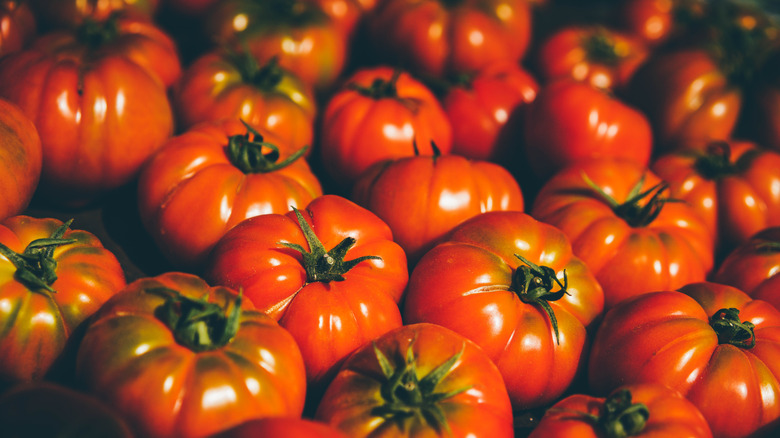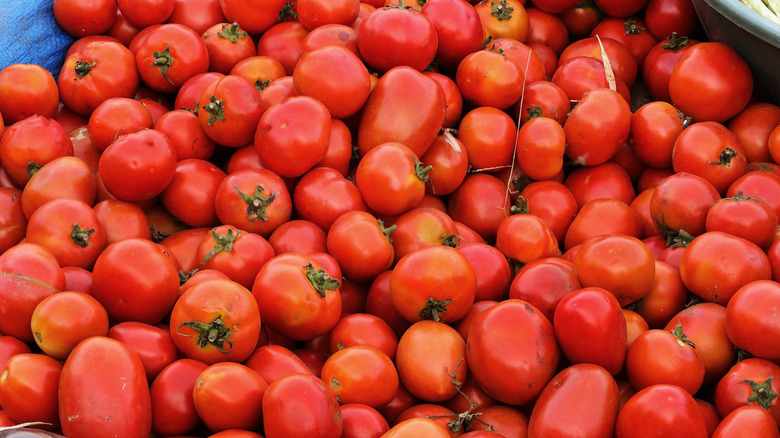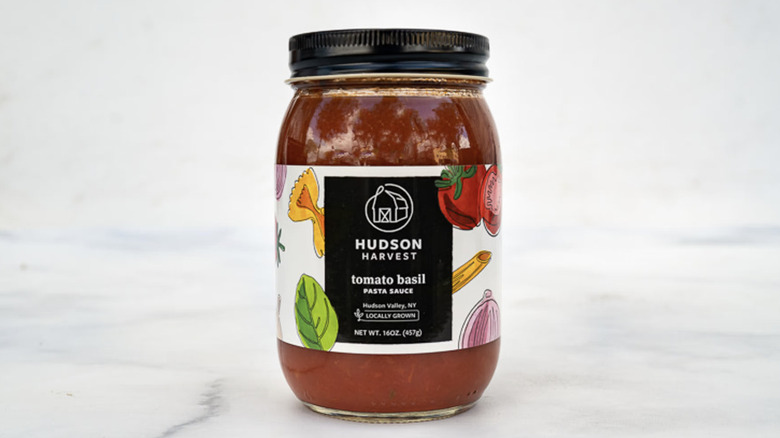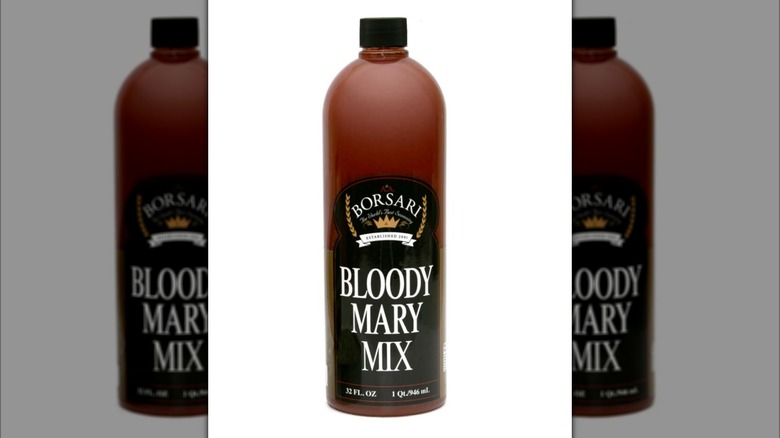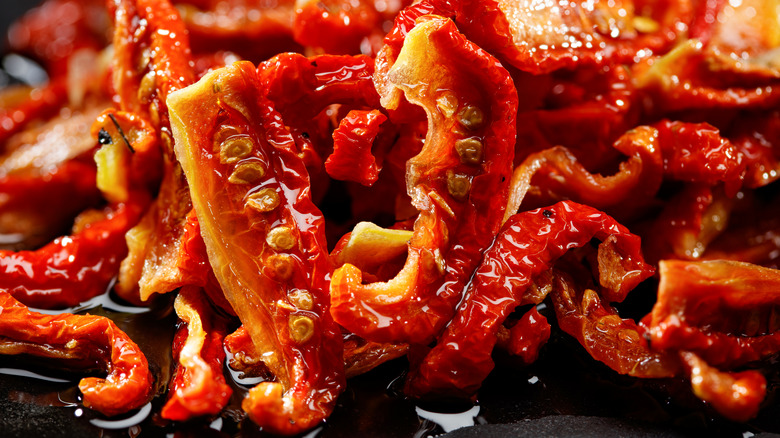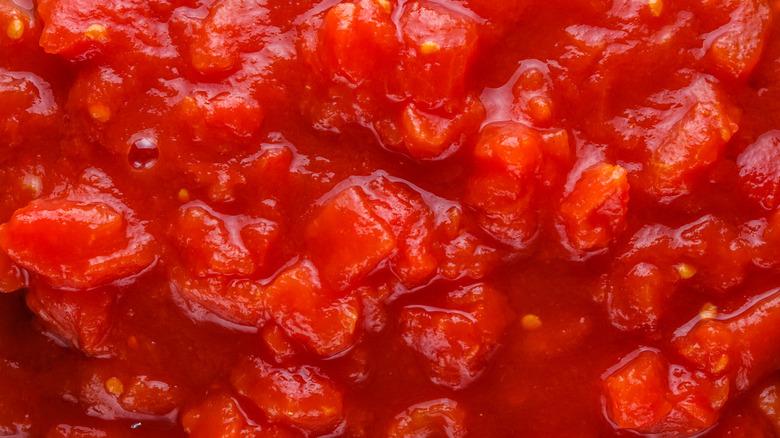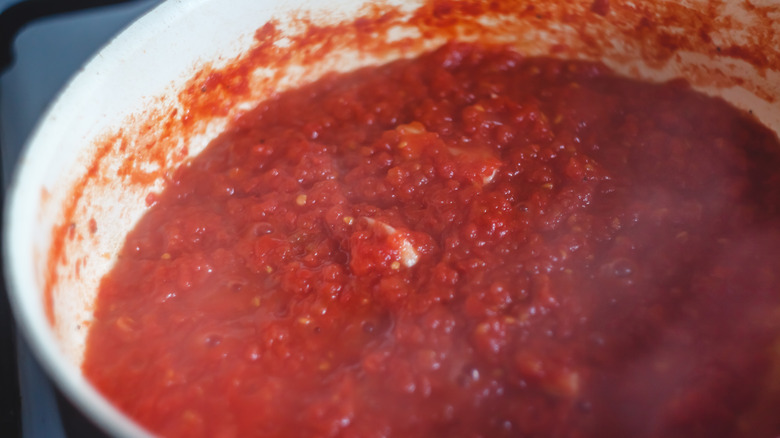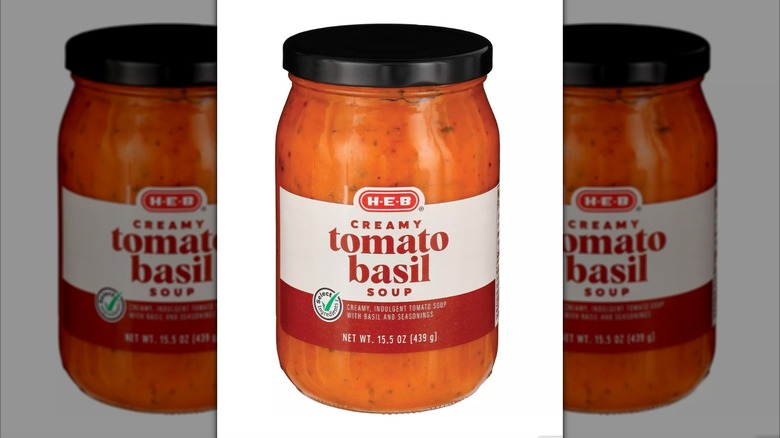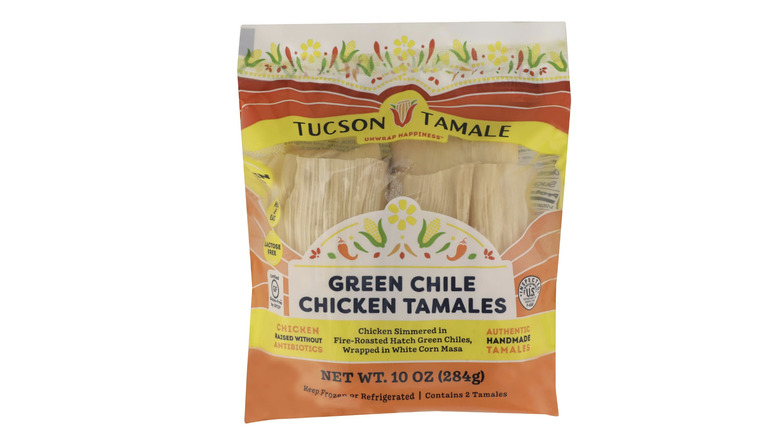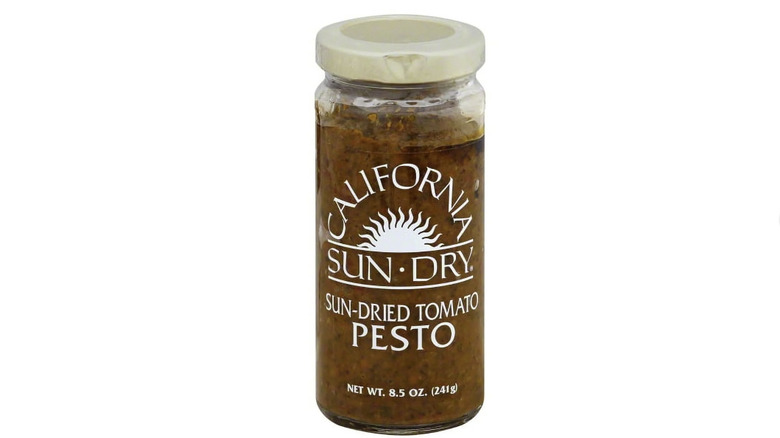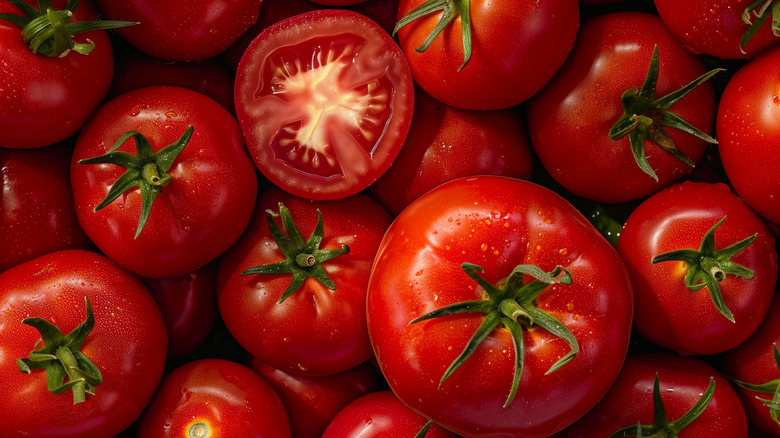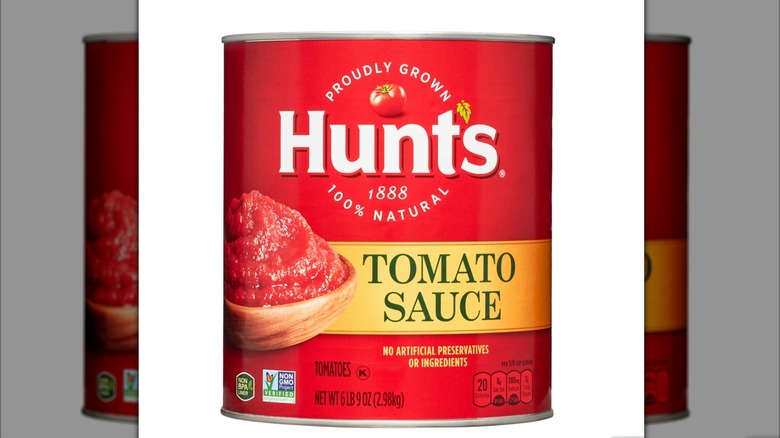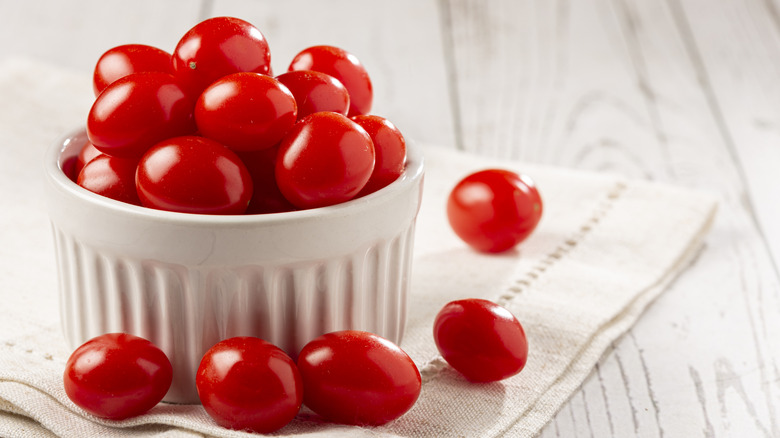Tomato Recalls That Affected Millions
We may receive a commission on purchases made from links.
Sliced on sandwiches, blended in sauces, or tossed into salads, tomatoes are a cornerstone of everyday meals. Aside from fresh options, tomatoes can be purchased sun-dried or incorporated into a sauce, soup, spread, or pesto, only adding to their culinary appeal. The sweet and juicy berries — believe it or not, tomatoes fall under the category of berries, not vegetables — are also highly nutritious, offering antioxidants, folate, vitamin C, potassium, and vitamin K.
Despite their numerous benefits, fresh tomatoes and tomato products can pose serious food safety risks if not handled correctly. From bacterial contamination to undeclared allergens, there are plenty of reasons why tomatoes have occasionally been pulled from grocery store shelves. Many of the recalls have been initiated after routine testing revealed the presence of harmful bacteria or consumers complained about unusual tastes, packaging defects, or labeling mistakes.
Ready to take a deep dive into some of the most significant tomato recalls in recent history? Keep reading for a closer look at tomato recalls that shook U.S. supermarket produce aisles.
Williams Farms Repack LLC recalls tomatoes over fears of salmonella contamination (2025)
The last thing anybody expects when slicing fresh tomatoes for a summer salad is a potential health hazard. However, this is precisely what happened in May 2025, when Williams Farms Repack LLC recalled its tomatoes due to potential salmonella contamination. In a typical food chain cascade, Williams Farms Repack sounded the alarm after a notification from its supplier, Southeast Tomato Distributors, that its tomatoes — originally sourced from H&C Farms — might be contaminated by the pathogen. The tomatoes were shipped to wholesalers and distributors in three Southern states: Georgia, North Carolina, and South Carolina.
Even though no illnesses were linked to the affected tomatoes at the time, the FDA issued the incident a Class I designation — the most serious of the three classifications. Class I recalls indicate "a situation in which there is a reasonable probability that the use of, or exposure to, a violative product will cause serious adverse health consequences or death."
Salmonella is nothing to take lightly. Even in healthy adults, the bacteria can lead to diarrhea, nausea, vomiting, abdominal pain, and fever. The pathogen can be much more dangerous for young children, the elderly, and people with weakened immune systems, sometimes causing prolonged illness or death.
Hudson Harvest recalls a tomato sauce due to possible under-processing (2024)
Founded in 2011 as Hudson Valley Harvest, Hudson Harvest is committed to sourcing products from local farms, butchers, millers, and cheese-makers. The Germantown, New York, company made headlines in 2024 when it pulled Hudson Harvest Tomato Basil Sauce from supermarket shelves due to possible under-processing. The product was deemed unsafe for consumption due to concerns over swelling, leaking, or bursting jars. The 16-ounce glass jars were sold at grocery stores in New York, Connecticut, and Massachusetts.
Under-processing can lead to bacterial growth, including dangerous pathogens like botulinum, the neurotoxin that causes botulism. The life-threatening condition manifests itself in symptoms such as nausea, vomiting, weakness, dizziness, blurred or double vision, and difficulty breathing. Due to the potential risk, the FDA labeled the incident a Class II recall, defined as "a situation in which use of, or exposure to, a violative product may cause temporary or medically reversible adverse health consequences or where the probability of serious adverse health consequences is remote."
Borsari Foods recalls Bloody Mary Mix due to the presence of undeclared allergens (2024)
A classic Bloody Mary is arguably the queen of brunch drinks, made with vodka, tomato juice, lemon juice, Worcestershire sauce, Tabasco, and black pepper. To simplify the cocktail-making process, tipplers can opt for a store-bought Bloody Mary mix, a base that replaces most of the ingredients in the recipe.
In December 2024, Borsari Foods came under the microscope when it recalled its own Bloody Mary mix due to not one, but two, undeclared allergens. The two ingredients, which weren't listed on the product label, were soy and fish — more specifically, anchovies. Both of these ingredients are among the FDA's nine major allergens, alongside milk, eggs, peanuts, tree nuts, wheat, sesame, and shellfish. The 32-ounce clear plastic bottles of the mix were sold in stores in New York and online. No allergic reactions to the product were reported by consumers at the time of the recall.
Global Veg Corp recalls sun-dried tomato halves due to undeclared sulfites (2023)
Traditionally dehydrated in natural sunlight, today's commercially produced sun-dried tomatoes are often prepared in ovens or food dehydrators. Regardless of the approach taken, the process concentrates the tomatoes' flavor, making them an ideal umami addition to sandwiches, wraps, pasta sauces, and salads.
In 2023, Global Veg Corp initiated a health alert after the New York State Department of Agriculture and Markets Food Inspectors revealed that its sun-dried tomatoes contained sulfites, which weren't listed on the product's packaging. The product in question, Aviator Sundried Tomato Halves, came packaged in 5-pound vacuum bags and was distributed nationwide, making the recall noteworthy for its wide scope. It's unclear whether the tomatoes were in fact sun-dried or dehydrated using mechanical methods — only that the product originated in Turkey.
While sulfites are generally considered safe for human consumption, they must be declared on product labels to protect consumers sensitive to the additive. Individuals with a sulfite allergy are at risk of adverse reactions, including shortness of breath, chest tightness, coughing, sneezing, hives, and, in the most serious cases, anaphylaxis.
Ingomar Packing recalls diced tomato due to potential contamination with foreign object (2023)
Founded in 1983, Ingomar Packing is a grower-owned company based in Los Banos, California. The company specializes in tomato products — mainly diced tomatoes and tomato paste — sourced from local growers. Four decades after its inception, Ingomar Packing found itself in the spotlight when it announced a recall of its diced tomatoes due to the presence of one potentially harmful contaminant: plastic.
The affected products included diced tomatoes in juice packed in 55-gallon fiber drums and 55-gallon metal drums. In total, the recall affected over 4,200 containers. The products were shipped to California and Washington, as well as abroad to Japan. It's unclear how the plastic fragments ended up in the containers of diced tomatoes. The FDA assigned the diced tomato recall a Class II grading, meaning there was little probability of the plastic causing serious harm, and the recall was terminated in 2024.
Hungryroot recalls marinara sauce due to yeast and mold contamination (2023)
As simple as it is delicious, a basic marinara sauce combines staple ingredients such as crushed tomatoes, garlic, onion, and olive oil. The versatile sauce is often used in a range of dishes, including pasta, pizza, eggplant parmesan, chicken parmesan, and meatballs. Those who don't like to spend too much time in the kitchen can easily opt for a convenient, store-bought version of the sauce.
In 2023, home chefs who did just that by purchasing Hungryroot's sauce were in for an unpleasant surprise when the company recalled the marinara due to possible contamination with yeast and mold. The product had been shipped to grocery stores in California, New Jersey, and Indiana. In total, the company withdrew 81,312 units — or over 61,000 pounds' worth — of the product from commercial circulation. The FDA gave Hungryroot's marinara sauce a Class II rating, indicating that eating the product could lead to mild to moderate illness, but that the risk of serious long-term harm was unlikely.
Fischer & Wieser Specialty Foods recalls H-E-B Creamy Tomato Basil Soup due to possible presence of glass fragments (2021)
Fischer & Wieser Specialty Foods dates back to 1969, when Mark Wieser set up a modest roadside stand in Fredericksburg, Texas, where he sold jams and jellies made from locally sourced produce. Today, Fischer & Wieser offers more than 150 products, including condiments, hearty soups, pasta sauces, marinades, and pie fillings. One of these products, H-E-B Creamy Tomato Basil Soup, became the subject of a November 2021 recall after a consumer found a shard of glass in their tomato soup.
The notification prompted Fischer & Wieser Specialty Foods to issue a recall of the product. The affected 31.4-ounce jars of the soup had an expiry date fixed for October 2022. It's unclear just how the glass entered the production stream, but luckily, no injuries were linked to the consumption of the product at the time.
Tucson Tamale Wholesale recalls tamales with tomatoes (2020)
Already feeding the hungry masses thousands of years ago in prehistoric Mesoamerica, tamales are made with corn-based masa and fillings such as shredded pork, chicken, and beans. They are usually wrapped in dried corn husks or banana leaves and steamed. In November 2020, a range of Tucson Tamale Wholesale's products were found to contain an additional — and highly undesirable — ingredient: hard plastic.
The recall involved Tuscan Tamale Green Chile Chicken Tamales and Tuscan Tamale Green Chile Pork & Cheese Tamales in different packaging variations. The alert was raised after Tucson Tamale found fragments of hard plastic in the cans of diced tomatoes in purée that had been shipped to the company by an ingredient supplier. While the foreign material posed a choking hazard and could have led to serious oral injury, such as damaged teeth or gums, fortunately, no adverse health effects were reported by consumers at the time of the recall.
Hy‑Vee Prepared Foods recalls fire-roasted tomato blend over fears of salmonella and listeria contamination (2018)
Hy‑Vee Prepared Foods traces its roots to 1930, when Charles Hyde and David Vredenburg opened a small general store in Beaconsfield, Iowa. The operation grew into a chain of stores, which were renamed Hy‑Vee in 1952, combining both founders' names. Today, the chain boasts more than 300 locations, with its most significant presence in Iowa and Minnesota.
Despite its regional success, Hy‑Vee hasn't been immune to mishaps. In 2018, the company announced that it was recalling six of its meat and potato products, including Hy-Vee Fire Roasted Tomato, Spinach, Mozzarella Twice Baked Potatoes, due to fears of salmonella and listeria contamination. The move was a direct result of a recall by Hy-Vee's supplier, McCain Foods, of batches of caramelized mushrooms and fire-roasted tomatoes. The ingredients were used in all six products that Hy‑Vee pulled from the shelves. Given that no illnesses were linked to any of the products, Hy‑Vee's recall was only initiated as a precaution. Better safe than sorry.
California Sun Dry Foods recalls sun-dried tomato pesto due to undeclared allergens (2017)
California Sun Dry Foods specializes in products with naturally dried, vine-ripened tomatoes. Unlike some other companies that dehydrate their tomatoes in ovens, California Sun Dry Foods dries out the juicy red orbs over seven to 10 days via the old-fashioned method — leaving them out under the California sun. The company offers julienne-cut sun-dried tomatoes, sun-dried tomato halves with a range of aromatics, as well as sun-dried tomato pesto and spreads.
In 2017, California Sun Dry Foods announced a recall of its Sun-Dried Tomato Pesto due to the possibility that the product contained two undeclared allergens — almonds and milk. While the jars featured the correct front label, the back label may have been incorrect, listing the ingredients for California Sun Dry Sun-Dried Tomato Garlic — a product that doesn't contain milk and almonds. The blunder came to light after a California Sun Dry Foods employee discovered a mislabeled product while setting up a display area. The pesto was shipped to stores throughout the U.S. The FDA assigned the recall a Class I category, underscoring the potential for significant harm.
Big Red Tomato Packers recalls fresh tomatoes due to possible salmonella contamination (2014)
There are few kitchen staples better than ripe, juicy tomatoes. Whether eaten straight off the vine, added to pasta sauce, or tossed into chilled gazpacho, fresh tomatoes can add the ideal balance of tartness and sweetness to a wide range of dishes. Unfortunately, tomatoes can occasionally carry harmful bacteria, particularly if a company that grows and packs them doesn't follow the correct safety protocols.
Although it's unclear what exactly went wrong, Big Red Tomato Packers' tomatoes were recalled in 2014 due to concerns about salmonella contamination. The Florida-based company distributed the produce in Florida, North Carolina, Michigan, Minnesota, Pennsylvania, and Tennessee. At the end of the day, Big Red Tomato Packers ended up recalling 790 boxes, amounting to nearly 20,000 pounds of the red globes. Fortunately, no cases of salmonella were linked to the tomatoes at the time of the health alert.
Conagra Foods recalls Hunt's canned tomato sauce due to can defect (2013)
Starting out as Nebraska Consolidated Mills, Conagra Foods is a packaged food giant that has been in business since 1919. Today, the company owns over 40 production facilities and employs more than 18,000 people. Its expansive product lineup includes popular brands, such as Birds Eye, Healthy Choice, Marie Callender's, and Slim Jim.
Proving that even well-established brands can experience safety scares, in January 2013, Conagra Foods recalled Hunt's Tomato Sauce because of a can defect. More specifically, the cans were found to have a faulty inner lining. While Conagra Foods insisted that this was purely a packaging issue, the company still recalled the product, specifying that the faulty lining could result in the cans spraying sauce when opened. The 8-ounce cans of the tomato sauce were distributed throughout 12 states in the U.S.
Combs Produce recalls Cross Valley Farms whole tomatoes over fears of E. coli (2012)
A fresh produce brand under the umbrella of US Foods, Cross Valley Farms offers a wide range of produce, including tomatoes, potatoes, and lettuce. According to the company, all of its food items must satisfy a set of "strict specifications" and all of its tomatoes are "double washed during the repacking and sorting process" (via US Foods). Still, this attention to detail was not sufficient to prevent E. coli from contaminating some of the company's tomatoes in 2012.
While the tainted tomatoes were technically part of US Foods' Cross Valley Farms line, the recall was initiated by Combs Produce, which handled the product's distribution. The tomatoes were also sold under the Packer Label brand. The tainted tomatoes were distributed to two Combs Produce distribution centers in Texas, where equipment tested positive for E. coli. Given the seriousness of the situation, the FDA gave the safety alert its highest Class I recall designation.
Typically contracted by eating raw vegetables and undercooked ground beef, symptoms of E. coli usually appear between three and four days after eating contaminated food. The symptoms of the infection typically include diarrhea, stomach cramps, nausea, and vomiting. In the most serious cases, E. coli can lead to severe complications, such as kidney failure and even death.
Andrew Williamson Fresh Produce recalls organic grape tomatoes due to salmonella concerns (2011)
Just as their name suggests, grape tomatoes have an oval shape. Measuring 0.5 to one inch in diameter, they are similar in size to cherry tomatoes. Grape tomatoes are sweet and juicy, which makes them ideal for snacking, as well as salad, pasta, and bruschetta. Unfortunately, grape tomatoes became the focus of a food safety alert issued by Andrew Williamson Fresh Produce in 2011.
Andrew Williamson Fresh Produce recalled Limited Edition and Fresh & Easy organic grape tomatoes after random testing found salmonella in a single clamshell container. The United States Department of Agriculture in Michigan carried out the random sampling that revealed the contamination. The grape tomatoes, which were distributed to retailers in 18 states and two Canadian provinces, had been imported from Mexico. Later, the recall was expanded to every state over fears that customers may have distributed the tomatoes further than originally thought.
It was unclear how the salmonella ended up on the packaging. However, no health complaints had been linked to the produce at the time it was pulled from grocery stores.
